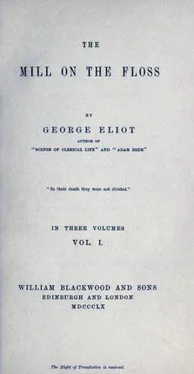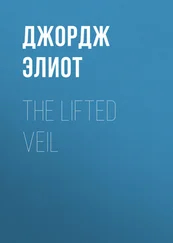But not even a direct argument from that typical Dodson female herself against his going to law could have heightened his disposition toward it so much as the mere thought of Wakem, continually freshened by the sight of the too able attorney on market-days. Wakem, to his certain knowledge, was (metaphorically speaking) at the bottom of Pivart's irrigation; Wakem had tried to make Dix stand out, and go to law about the dam; it was unquestionably Wakem who had caused Mr. Tulliver to lose the suit about the right of road and the bridge that made a thoroughfare of his land for every vagabond who preferred an opportunity of damaging private property to walking like an honest man along the highroad; all lawyers were more or less rascals, but Wakem's rascality was of that peculiarly aggravated kind which placed itself in opposition to that form of right embodied in Mr. Tulliver's interests and opinions. And as an extra touch of bitterness, the injured miller had recently, in borrowing the five hundred pounds, been obliged to carry a little business to Wakem's office on his own account. A hook-nosed glib fellow! as cool as a cucumber, — always looking so sure of his game! And it was vexatious that Lawyer Gore was not more like him, but was a bald, round-featured man, with bland manners and fat hands; a game-cock that you would be rash to bet upon against Wakem. Gore was a sly fellow. His weakness did not lie on the side of scrupulosity; but the largest amount of winking, however significant, is not equivalent to seeing through a stone wall; and confident as Mr. Tulliver was in his principle that water was water, and in the direct inference that Pivart had not a leg to stand on in this affair of irrigation, he had an uncomfortable suspicion that Wakem had more law to show against this (rationally) irrefragable inference than Gore could show for it. But then, if they went to law, there was a chance for Mr. Tulliver to employ Counsellor Wylde on his side, instead of having that admirable bully against him; and the prospect of seeing a witness of Wakem's made to perspire and become confounded, as Mr. Tulliver's witness had once been, was alluring to the love of retributive justice.
Much rumination had Mr. Tulliver on these puzzling subjects during his rides on the gray horse; much turning of the head from side to side, as the scales dipped alternately; but the probable result was still out of sight, only to be reached through much hot argument and iteration in domestic and social life. That initial stage of the dispute which consisted in the narration of the case and the enforcement of Mr. Tulliver's views concerning it throughout the entire circle of his connections would necessarily take time; and at the beginning of February, when Tom was going to school again, there were scarcely any new items to be detected in his father's statement of the case against Pivart, or any more specific indication of the measures he was bent on taking against that rash contravener of the principle that water was water. Iteration, like friction, is likely to generate heat instead of progress, and Mr. Tulliver's heat was certainly more and more palpable. If there had been no new evidence on any other point, there had been new evidence that Pivart was as "thick as mud" with Wakem.
"Father," said Tom, one evening near the end of the holidays, "uncle Glegg says Lawyer Wakem is going to send his son to Mr. Stelling. It isn't true, what they said about his going to be sent to France. You won't like me to go to school with Wakem's son, shall you?"
"It's no matter for that, my boy," said Mr. Tulliver; "don't you learn anything bad of him, that's all. The lad's a poor deformed creatur, and takes after his mother in the face; I think there isn't much of his father in him. It's a sign Wakem thinks high o' Mr. Sterling, as he sends his son to him, and Wakem knows meal from bran."
Mr. Tulliver in his heart was rather proud of the fact that his son was to have the same advantages as Wakem's; but Tom was not at all easy on the point. It would have been much clearer if the lawyer's son had not been deformed, for then Tom would have had the prospect of pitching into him with all that freedom which is derived from a high moral sanction.
Chapter III. The New Schoolfellow
It was a cold, wet January day on which Tom went back to school; a day quite in keeping with this severe phase of his destiny. If he had not carried in his pocket a parcel of sugar-candy and a small Dutch doll for little Laura, there would have been no ray of expected pleasure to enliven the general gloom. But he liked to think how Laura would put out her lips and her tiny hands for the bits of sugarcandy; and to give the greater keenness to these pleasures of imagination, he took out the parcel, made a small hole in the paper, and bit off a crystal or two, which had so solacing an effect under the confined prospect and damp odors of the gig-umbrella, that he repeated the process more than once on his way.
"Well, Tulliver, we're glad to see you again," said Mr. Stelling, heartily. "Take off your wrappings and come into the study till dinner. You'll find a bright fire there, and a new companion."
Tom felt in an uncomfortable flutter as he took off his woollen comforter and other wrappings. He had seen Philip Wakem at St. Ogg's, but had always turned his eyes away from him as quickly as possible. He would have disliked having a deformed boy for his companion, even if Philip had not been the son of a bad man. And Tom did not see how a bad man's son could be very good. His own father was a good man, and he would readily have fought any one who said the contrary. He was in a state of mingled embarrassment and defiance as he followed Mr. Stelling to the study.
"Here is a new companion for you to shake hands with, Tulliver," said that gentleman on entering the study, — "Master Philip Wakem. I shall leave you to make acquaintance by yourselves. You already know something of each other, I imagine; for you are neighbors at home."
Tom looked confused and awkward, while Philip rose and glanced at him timidly. Tom did not like to go up and put out his hand, and he was not prepared to say, "How do you do?" on so short a notice.
Mr. Stelling wisely turned away, and closed the door behind him; boys' shyness only wears off in the absence of their elders.
Philip was at once too proud and too timid to walk toward Tom. He thought, or rather felt, that Tom had an aversion to looking at him; every one, almost, disliked looking at him; and his deformity was more conspicuous when he walked. So they remained without shaking hands or even speaking, while Tom went to the fire and warmed himself, every now and then casting furtive glances at Philip, who seemed to be drawing absently first one object and then another on a piece of paper he had before him. He had seated himself again, and as he drew, was thinking what he could say to Tom, and trying to overcome his own repugnance to making the first advances.
Tom began to look oftener and longer at Philip's face, for he could see it without noticing the hump, and it was really not a disagreeable face, — very old-looking, Tom thought. He wondered how much older Philip was than himself. An anatomist — even a mere physiognomist — would have seen that the deformity of Philip's spine was not a congenital hump, but the result of an accident in infancy; but you do not expect from Tom any acquaintance with such distinctions; to him, Philip was simply a humpback. He had a vague notion that the deformity of Wakem's son had some relation to the lawyer's rascality, of which he had so often heard his father talk with hot emphasis; and he felt, too, a half-admitted fear of him as probably a spiteful fellow, who, not being able to fight you, had cunning ways of doing you a mischief by the sly. There was a humpbacked tailor in the neighborhood of Mr. Jacobs's academy, who was considered a very unamiable character, and was much hooted after by public-spirited boys solely on the ground of his unsatisfactory moral qualities; so that Tom was not without a basis of fact to go upon. Still, no face could be more unlike that ugly tailor's than this melancholy boy's face, — the brown hair round it waved and curled at the ends like a girl's; Tom thought that truly pitiable. This Wakem was a pale, puny fellow, and it was quite clear he would not be able to play at anything worth speaking of; but he handled his pencil in an enviable manner, and was apparently making one thing after another without any trouble. What was he drawing? Tom was quite warm now, and wanted something new to be going forward. It was certainly more agreeable to have an ill-natured humpback as a companion than to stand looking out of the study window at the rain, and kicking his foot against the washboard in solitude; something would happen every day, — "a quarrel or something"; and Tom thought he should rather like to show Philip that he had better not try his spiteful tricks on him. He suddenly walked across the hearth and looked over Philip's paper.
Читать дальше












